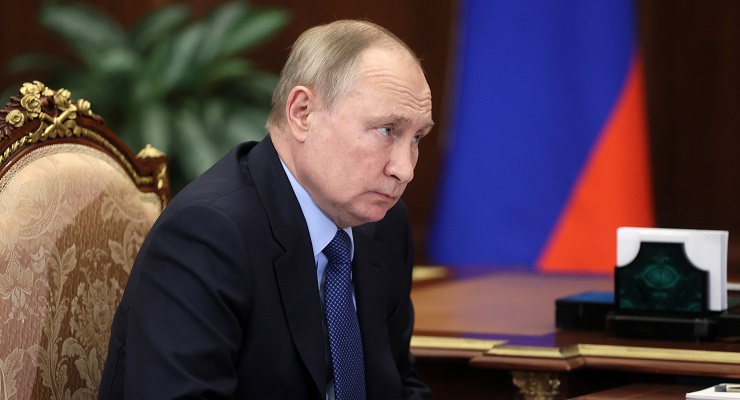
Discontent about the Kremlin’s war in Ukraine is growing inside Russia — but it’s not coming from dissidents, who have been jailed or forced into exile. Instead, it’s coming from hawkish veterans groups and military bloggers in Russia, who are expressing growing agitation with the slow pace of the war, with some calling on Russian President Vladimir Putin to institute national mobilisation.
The rumblings from staunchly nationalist figures offer a glimpse at the corner into which Putin has painted himself as he contends with a public hungry for a much-promised victory and a military too exhausted to deliver one. British defence intelligence reported this week that Russia is estimated to have lost more troops in the first three months of the war in Ukraine than during the Soviet Union’s nine-year war in Afghanistan.
A rapid crackdown at the outset of the war made it all but impossible for independent media and opposition figures to openly critique the war, while thousands of street protesters were quickly arrested. But Russian military bloggers have been given a free hand on the social media app Telegram, offering a rare avenue of dissent.
While these groups are far from the inner sanctum of Kremlin politics, the rumblings underscore the fact that if Putin is to face any real challenge over the war in Ukraine, it will likely come from hawks who feel it hasn’t gone far enough.
“These people are not calling for Russia to stop the war,” said Kateryna Stepanenko, an analyst with the Institute for the Study of War. “All of the military channels that I follow, they are explicitly saying that ‘we are criticizing the Russian government and military command for the sole purpose of Russian victory’.”
In an open letter sent last week to Putin and other senior officials, a Russian veterans group described the inability to capture Kyiv as a “failure” and condemned the army’s shortages of drones, ammunition, and thermal imaging. The letter from the All-Russian Officers Assembly was deeply infused with ethnonationalist language and conspiracy theories, describing the battle as a battle for the “preservation of a white and Christian Europe”.
One of the most vocal critics of the war is former FSB officer Igor Girkin, better known by his nom de guerre Strelkov, who helped initiate the war in the Donbas in the spring of 2014 when he led a group of militants to seize the city of Sloviansk before rising to briefly become the minister of defense of the breakaway Donetsk People’s Republic.
This week, Girkin amplified reports that fighters from the Donetsk region were allegedly forced to mobilise at the beginning of the war and were pushed into battle poorly equipped with little training, sustaining high losses. While unable to independently verify the claims, the Institute for the Study of War noted in its daily report on Wednesday that such critiques of the war would not have gained such traction earlier in the campaign, “demonstrat[ing] the strong resonance anti-Kremlin narratives can now have”.
Telegram channels have offered a new and unique platform for analysis and discussion about Russia’s highly secretive military. “In three months of the war, something completely unprecedented has emerged — a space for debate within the Russian army, uncensored, and beyond the control of the Ministry of Defense,” Russian journalists Andrei Soldatov and Irina Borogan wrote in a blog post for the think tank the Center for European Policy Analysis. “Don’t be misled — these are not peaceniks in the making. If they criticize the army and the Kremlin, they do so from more radical positions,” they wrote.
The last straw for many appears to have been Russia’s catastrophic attempts to cross the Siverskyi Donets River in early May, which is thought to be one of the single deadliest episodes in the war so far. Russia is estimated to have lost almost 500 troops and some 80 pieces of equipment, which were closely arrayed like sitting ducks on the riverbank.
A Telegram user who goes by the name Rybar posted a scathing critique of Russian commanders, which began to gain traction among other military bloggers on the platform, who until then had been championing the war effort, said Stepanenko, who monitors the accounts. It opened the floodgates as users began to question the pace of the war, comparing the Russian and Ukrainian military operations, reposting images from Western sources, and questioning Russian propaganda.
“It seems to me to be a clear indication that they need to be worried about this,” said Fred Kagan, director of the Critical Threats Project at the American Enterprise Institute. “They’re engaged in a whole process of trying to talk these bloggers down,” said Kagan, who noted that the bloggers could have a potent impact on the already flagging morale of Russian troops.
Russian Defense Minister Sergei Shoigu this week acknowledged for the first time that the war was behind schedule, which analysts interpreted as an attempt to manage public expectations about the war.
Other analysts are more skeptical about the impact of the military bloggers. “They do not have an important political influence,” said Tatiana Stanovaya, a nonresident scholar at the Carnegie Endowment for International Peace. The real risk, Stanovaya said, comes from dashed expectations as promises by Russian officials and state television of a rapid victory look ever more elusive.
“In this way we can talk about some kind of political danger, because they heat the society, and it creates political pressure on Putin that he must finish this war, to win, to go to the end,” she said.








I think that once the Donbass is completely cleaned of the UAF and their Nazi henchmen we can expect to see the 1st Guards Tank Army let loose on the Ukrainian plains. By then, the Ukrainian army will be demolished and the dreams of the west to have another million men armed, trained and ready to fight the Russians by then will be shown to be the pipe dream it always was for it takes over a year to train a soldier, even more if they are operating complex machinery. So therefore, the 1st Guards Tank Army will have far less opposition than its forbear in the Second World War did against the Wehrmacht. I understand training a pilot is far longer and Ukraine’s air force is basically non-existent anyway. Ukraine will probably be mostly Russian except the western part and who would want that what with its Bandera (Waffen SS) background – a poison chalice for whatever country decides to incorporate it – as well as it being landlocked and isolated from its old agricultural and industrial sources of income from Central and Western Ukraine. That will quieten any of Putin’s critics at home which will only increase his popularity from the present mid 70% to maybe his stellar popularity of a few years ago of over 83%.
So just to be clear, the invasion predicated on removing Nazis is important so that it can preserve a white and Christian Europe? Sounds like maybe they’re fighting themselves..
The use of the term Nazi is quite broad, it seems.
Anyone can be a Russian blogger, Putin still commands an 80% approval rating. Sleepy Joes rating matched his current IQ level.
It would be interesting to hear from the junior Officers and senior NCOs actually doing the fighting.
I wonder if they would be so gung ho?
Russia doesn’t have effective NCOs in the Western sense. This lack of a bottom level of command also explains the lack of discipline shown by Russian troops in places they’ve occupied, as well as inflexibility. I assume it’s so they can maintain centralised control, but I’ve heard a problem with that is that senior officers have to go up to the front line where they’re preferred target of opportunity for Ukrainian snipers…
If it wasn’t for the ongoing suffering of the Ukranian people I’d say good on those Russian military bloggers and foment away, but in reality their efforts are more likely to involve additional suffering across the Russian border.